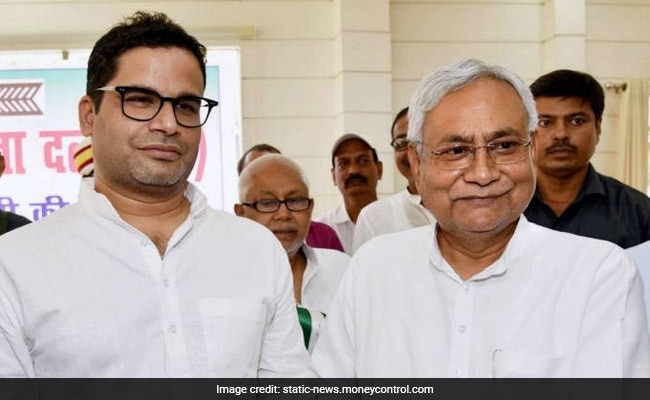Political strategist-turned-politician Prashant Kishor has forecasted a significant shift in Bihar’s political landscape, asserting that Chief Minister Nitish Kumar will not secure a fifth consecutive term, irrespective of his political alliances. Kishor, addressing a press conference in West Champaran, Bihar, emphasized that Kumar’s diminishing popularity would impede his continuation in power.
Kishor, who now leads the Jan Suraaj Party, remarked, “Anybody can become the chief minister after the assembly elections are over, except Nitish Kumar. You can take it from me in writing. If I am proven wrong, then I will give up my own political campaign.” He further predicted that Kumar would likely contest the upcoming assembly elections in alliance with the Bharatiya Janata Party but might switch sides post-elections in pursuit of retaining his position.
This assertion comes amid Bihar’s intricate political dynamics, where Kumar has historically shifted alliances between the BJP-led National Democratic Alliance and the Rashtriya Janata Dal -led Mahagathbandhan. Kishor’s comments underscore a skepticism about Kumar’s consistency, labeling him as the “sardar of palturams,” implying a leader prone to frequent political realignments.
Kishor’s critique extends beyond Kumar’s alliance strategies. He has questioned the Chief Minister’s physical and mental fitness to govern, suggesting that the BJP’s support for Kumar is a strategic move that may ultimately harm Bihar’s political stability. Kishor has expressed intentions to offer an alternative political platform focused on education and employment, aiming to address what he perceives as the current administration’s shortcomings.
The BJP, on its part, has been recalibrating its strategy in Bihar. Recent developments indicate a potential re-entry of the BJP into the state government, with discussions about replicating the 2020 governance model where Kumar remained Chief Minister with two deputies from the BJP. This move is seen as an effort to consolidate the NDA’s position ahead of the 2025 assembly elections.
However, Kishor remains skeptical about the durability of such alliances. He has openly stated that the BJP’s alliance with Kumar is unlikely to last beyond the 2024 Lok Sabha elections, predicting that Kumar’s JD would struggle to secure more than 20 seats in the 2025 assembly elections. Kishor has gone so far as to pledge his retirement from politics if proven wrong on this prediction.
Kishor’s political journey has been intertwined with Bihar’s electoral politics. Having previously collaborated with Kumar, their relationship soured, leading to Kishor’s expulsion from the JD in 2020. Since then, Kishor has been vocal about his criticisms of Kumar’s leadership and the state’s political direction.
The upcoming assembly elections in Bihar are poised to be a litmus test for Kumar’s enduring political influence. While the Chief Minister has been a dominant figure in Bihar’s politics for over two decades, his frequent alliance shifts have drawn both strategic praise and public skepticism. The electorate’s response to these maneuvers will be crucial in determining the state’s political future.
Kishor’s predictions add a layer of intrigue to the electoral narrative. His assertions challenge the status quo and suggest a potential realignment of political forces in Bihar. As the state approaches the 2025 assembly elections, the strategies adopted by key players like Kumar, the BJP, and emerging entities like Kishor’s Jan Suraaj Party will significantly influence the electoral outcomes.
In the context of Bihar’s socio-political fabric, issues such as governance, development, and public welfare remain paramount. The electorate’s priorities and their perception of the incumbent administration’s performance will play a decisive role in the forthcoming elections. Kishor’s emphasis on education and employment as focal points of his political agenda resonates with the aspirations of a substantial segment of Bihar’s populace.




 Rubrik Unveils New Capabilities To Enhance Cyber Resilience
Rubrik Unveils New Capabilities To Enhance Cyber Resilience 